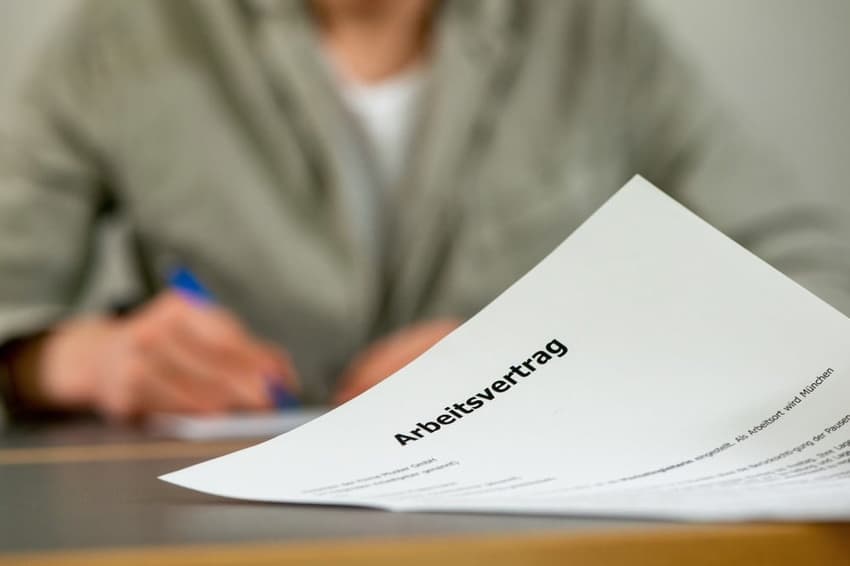EXPLAINED: What you should know if you want to quit your job in Germany

There are a few official steps to follow if you decide to quit your job in Germany - whether or not you have another one lined up.
Maybe you want to quit your current job in Germany because you found another one (logical, right?). Or maybe you decided to make the switch to freelancing, or simply have saved up for a self-funded sabbatical on a picturesque island.
Whatever your reasoning, there’s a process - like everything else in the Bundesrepublik - for giving up your position. And if you’re not moving onto another one right away, you could even qualify for unemployment benefits - despite voluntarily giving up your job.
Here’s what you need to know about moving on.
How to get started
Even if you’re disenchanted with your current employer and dream of making a cinematic “I QUIT” announcement to a packed room of clapping employees, that’s probably not the way to go about it.
As with many other countries, it’s the norm in Germany to first schedule a friendly chat (officially Kündigungsgespräch, or termination interview) with your direct manager - ideally face-to-face, but a video chat in the post-Covid era is usually fine too.
READ ALSO: The words and phrases you need to navigate the German job market
Come prepared to lay out the reasons you’re leaving, but stay away from negativity, advises German jobs-seeking website Stepstone. Rather, express your gratitude for what you’ve gotten out of the position - be it new skills or supportive colleagues - and propose how you want to wrap up your remaining tasks in the time before you go (which in most cases should be at least a month away).
Put it in writing
OK, you’ve made it through that announcement with as few awkward verbal stumbles as possible. Now you can take a bit more time to formulate an official letter. Section 623 of the German Civil Code says that you must do so for the termination to be official.
Note that this can’t be in email form, but rather needs to be a structured official letter which includes the firm’s address in the upper left corner, followed by a date and subject line, usually Kündigung meines Arbeitsvertrags (Cancellation of my work contract).

The first step of quitting your job in Germany is chatting with your manager. Photo by Tima Miroshnichenko from Pexels
You can also elaborate with a “vom” (from the) at the end, giving the exact date on which you plan to leave, and have ideally already discussed with your supervisor.
As with your initial conversation with your supervisor, keep the content polite and factually lay out your reasons for leaving the job. If you do have gripes, larger companies may offer an exit interview, which would be a prime time to lay them out.
Some contracts will specify how much advance notice you need to give before quitting your job. But when nothing's in writing, German law states that an employee needs to give at least four weeks' notice, starting at the 15th or the end of the month.
The exception to this rule is for employees in the 6-month long probation period, in which a two-week notification period, regardless of the day of the month, is accepted.
Only in extreme circumstances, for example, if an employer mistreats an employee or does something illegal, is a fristlose Kündigung (termination without a deadline) allowed.
Make sure it’s received
So you’ve taken the steps to ensure that your Kündigungsbrief (termination letter) is figuratively well received by your manager, but you should make sure that it’s also physically received in the first place. You can send it to your manager or HR department via registered mail, or hand it over in person.
In the letter itself, you can also ask for confirmation of receipt.
Check how many vacation days you have left
Your last day in the office (even in Home Office) is not necessarily your last official day: be sure to check with your HR department how many paid vacation days you have left, as this time will need to be taken during your notification period. Alternatively, your employer may allow you to be paid for any untaken holiday allowance if you would prefer the extra money in your final pay packet rather than taking the holiday days before leaving your job.
READ ALSO: Vacation days: What to know about your rights as an employee
Plan ahead for future jobs
In Germany, you have a legal right to a letter of reference (Arbeitszeugnis) from the company as soon as you’ve given your official notice. You can then use this statement to apply to other employers.

A person at a job interview in Germany. Photo: picture alliance/dpa/dpa-tmn | Christin Klose
Of course, if you had a tense relationship with your boss, such a letter could hurt more than hinder your chances with another company. But if there were just small misunderstandings in an otherwise pleasant work relationship, getting such a testament early on will give you time to go back to your manager and talk about how the letter could be reworded.
Apply for unemployment benefits, if necessary
If you left the job voluntarily, the German Employment Agency normally imposes a three-month blocking period (Sperrzeit) - this means that you are not entitled to unemployment benefits during this time. However, while you won't receive money from the job centre during this time, they will generally cover your health insurance payments.
READ ALSO: Do Germany's unemployment benefits proposals go far enough?
But if you don’t have a new employment contract lined up directly following your previous job, you’ll still need to register as unemployed on the first day outside of the job at the latest, regardless of the Sperrzeit, to be sure to receive benefits on time.
The earliest you can register as unemployed is three months before you actually become unemployed. If one or more of the following cases apply to you, the Sperrzeit period can also be waived:
- You can prove that you had a firm commitment to a new position that has fallen through.
- You rightly resigned without notice, for example because your employer did not pay you.
- You want to move in with someone else so you can take care of your children together.
- It can be proven that you are overwhelmed by your job (e.g. after submitting a medical certificate).
Comments
See Also
Maybe you want to quit your current job in Germany because you found another one (logical, right?). Or maybe you decided to make the switch to freelancing, or simply have saved up for a self-funded sabbatical on a picturesque island.
Whatever your reasoning, there’s a process - like everything else in the Bundesrepublik - for giving up your position. And if you’re not moving onto another one right away, you could even qualify for unemployment benefits - despite voluntarily giving up your job.
Here’s what you need to know about moving on.
How to get started
Even if you’re disenchanted with your current employer and dream of making a cinematic “I QUIT” announcement to a packed room of clapping employees, that’s probably not the way to go about it.
As with many other countries, it’s the norm in Germany to first schedule a friendly chat (officially Kündigungsgespräch, or termination interview) with your direct manager - ideally face-to-face, but a video chat in the post-Covid era is usually fine too.
READ ALSO: The words and phrases you need to navigate the German job market
Come prepared to lay out the reasons you’re leaving, but stay away from negativity, advises German jobs-seeking website Stepstone. Rather, express your gratitude for what you’ve gotten out of the position - be it new skills or supportive colleagues - and propose how you want to wrap up your remaining tasks in the time before you go (which in most cases should be at least a month away).
Put it in writing
OK, you’ve made it through that announcement with as few awkward verbal stumbles as possible. Now you can take a bit more time to formulate an official letter. Section 623 of the German Civil Code says that you must do so for the termination to be official.
Note that this can’t be in email form, but rather needs to be a structured official letter which includes the firm’s address in the upper left corner, followed by a date and subject line, usually Kündigung meines Arbeitsvertrags (Cancellation of my work contract).

You can also elaborate with a “vom” (from the) at the end, giving the exact date on which you plan to leave, and have ideally already discussed with your supervisor.
As with your initial conversation with your supervisor, keep the content polite and factually lay out your reasons for leaving the job. If you do have gripes, larger companies may offer an exit interview, which would be a prime time to lay them out.
Some contracts will specify how much advance notice you need to give before quitting your job. But when nothing's in writing, German law states that an employee needs to give at least four weeks' notice, starting at the 15th or the end of the month.
The exception to this rule is for employees in the 6-month long probation period, in which a two-week notification period, regardless of the day of the month, is accepted.
Only in extreme circumstances, for example, if an employer mistreats an employee or does something illegal, is a fristlose Kündigung (termination without a deadline) allowed.
Make sure it’s received
So you’ve taken the steps to ensure that your Kündigungsbrief (termination letter) is figuratively well received by your manager, but you should make sure that it’s also physically received in the first place. You can send it to your manager or HR department via registered mail, or hand it over in person.
In the letter itself, you can also ask for confirmation of receipt.
Check how many vacation days you have left
Your last day in the office (even in Home Office) is not necessarily your last official day: be sure to check with your HR department how many paid vacation days you have left, as this time will need to be taken during your notification period. Alternatively, your employer may allow you to be paid for any untaken holiday allowance if you would prefer the extra money in your final pay packet rather than taking the holiday days before leaving your job.
READ ALSO: Vacation days: What to know about your rights as an employee
Plan ahead for future jobs
In Germany, you have a legal right to a letter of reference (Arbeitszeugnis) from the company as soon as you’ve given your official notice. You can then use this statement to apply to other employers.

Of course, if you had a tense relationship with your boss, such a letter could hurt more than hinder your chances with another company. But if there were just small misunderstandings in an otherwise pleasant work relationship, getting such a testament early on will give you time to go back to your manager and talk about how the letter could be reworded.
Apply for unemployment benefits, if necessary
If you left the job voluntarily, the German Employment Agency normally imposes a three-month blocking period (Sperrzeit) - this means that you are not entitled to unemployment benefits during this time. However, while you won't receive money from the job centre during this time, they will generally cover your health insurance payments.
READ ALSO: Do Germany's unemployment benefits proposals go far enough?
But if you don’t have a new employment contract lined up directly following your previous job, you’ll still need to register as unemployed on the first day outside of the job at the latest, regardless of the Sperrzeit, to be sure to receive benefits on time.
The earliest you can register as unemployed is three months before you actually become unemployed. If one or more of the following cases apply to you, the Sperrzeit period can also be waived:
- You can prove that you had a firm commitment to a new position that has fallen through.
- You rightly resigned without notice, for example because your employer did not pay you.
- You want to move in with someone else so you can take care of your children together.
- It can be proven that you are overwhelmed by your job (e.g. after submitting a medical certificate).
Join the conversation in our comments section below. Share your own views and experience and if you have a question or suggestion for our journalists then email us at [email protected].
Please keep comments civil, constructive and on topic – and make sure to read our terms of use before getting involved.
Please log in here to leave a comment.